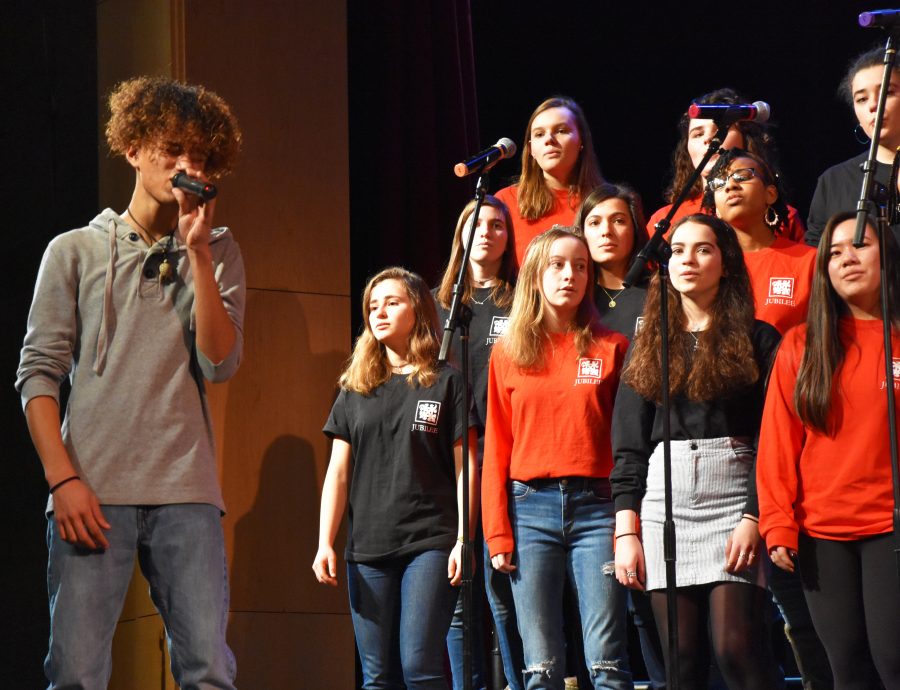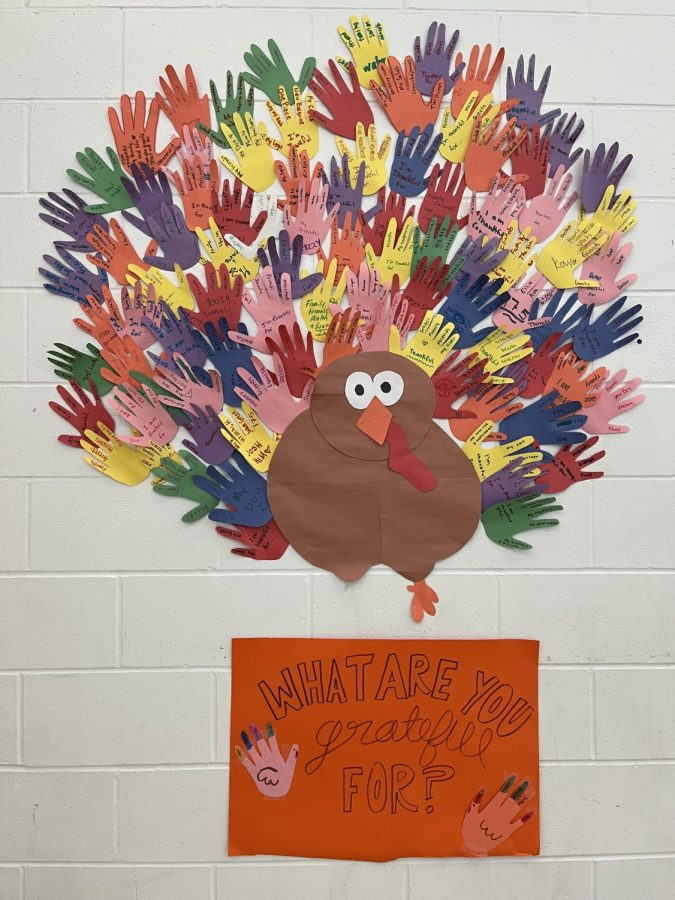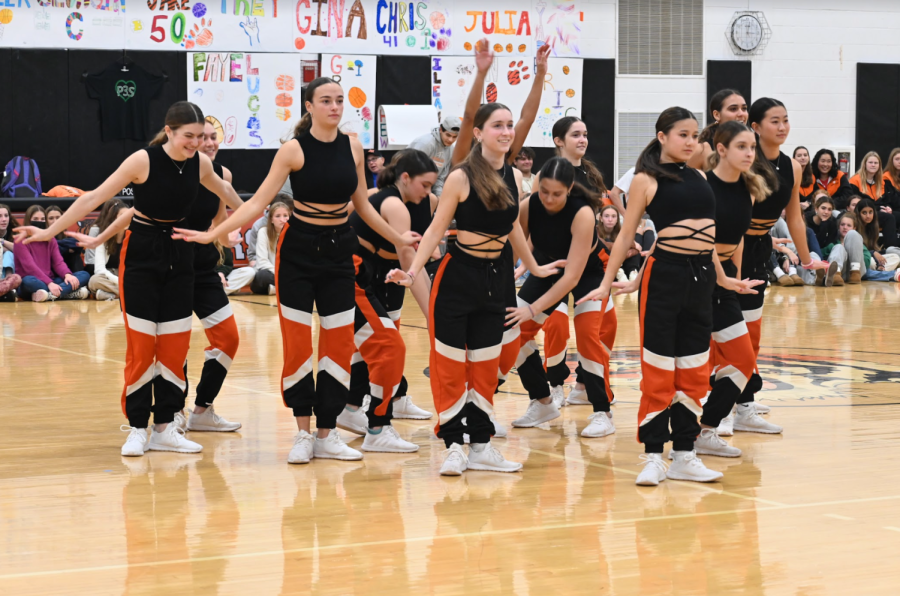A-block
by Amy Xue
Former Newton Mayor and North alumnus Setti Warren spoke about his experience with racial discrimination during A-block of Black Leadership Advisory Council (BLAC) Day Friday, Feb. 2.
Warren spoke about many instances of prejudice he has faced, as far back as when he was a toddler.
The moral of his many stories was to “not let anyone tell you that you can’t make a change” and to always “challenge yourself” and “make yourself feel uncomfortable,” he said.
One of the more prominent memories of racism in his life, Warren explained, was when he was around 12 or 13 and his youngest sister had a severe asthma attack around midnight. While his mother was driving them to the hospital, the driver behind his mother’s car tried to severely injure Warren and his family by smashing a bottle against the driver’s window.
Later, the police were able to identify the perpetrator as a 17-year-old North student, and the family had to decide whether to press charges. Warren said that his father gave his children the choice between pressing charges and asking the perpetrator and his parents to apologize. Eventually, Warren’s family chose not to press charges and asked the man and his dad to come and apologize.
“This grown man and this 17-year-old kid, they were both sobbing,” Warren recalled, “The police chief was there, and the kid apologized and left. That was it.” Even though Warren didn’t think much of it at the time, he explained that he now realizes that it was a “life-altering experience.” Reflecting back, Warren said that he learned from his father’s actions that fighting fire with fire is not always the answer. Even today, Warren said that he solves problems through conversation, rather than confrontation.
According to Warren, a few years later, as an undergrad at Boston College, he decided to run for the student body president. At that time, only about two percent of students on campus were black. He got to the finals and picked a woman as his vice president. His opponent, a white student, told Warren that he could not win because the college would never let a black person be president or a woman be vice president. Despite his doubtful peers, Warren explained that he won the presidency through perseverance and hard work.
Warren said that when he first ran for mayor of Newton in 2009, no black person had been mayor before, and again, many people doubted him, including his own friends. Nonetheless, Warren won after considerable campaigning. After serving two terms as mayor, Warren decided to run for governor this fall.
B-block
by Rose Skylstad
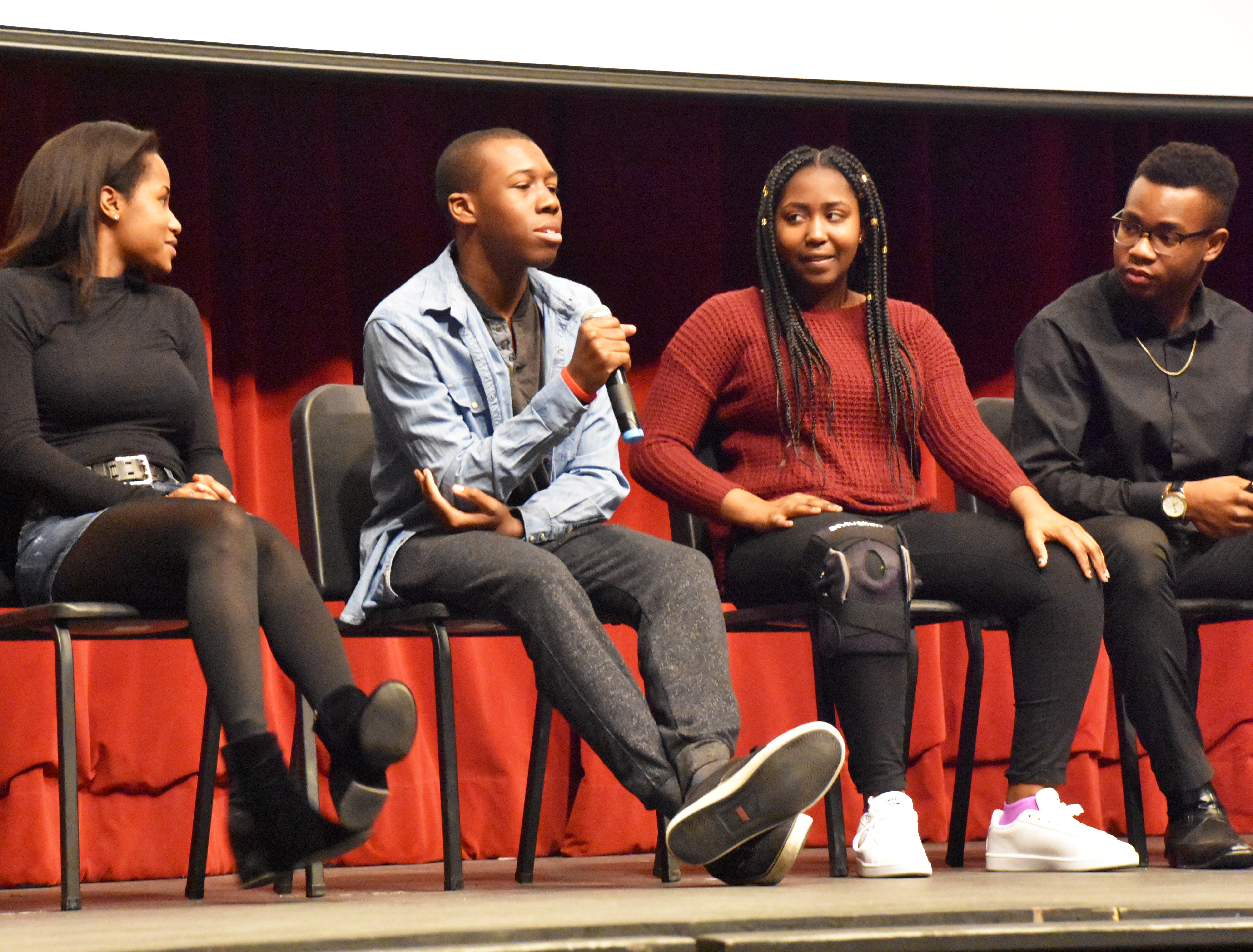
Students panelists discussed how their race affects them in life and in school B-block as a part of BLAC Day. The panel of six students tackled a number of topical issues, such as cultural appropriation, the use of the “n-word,” reverse racism, and white privilege.
The panel consisted of seniors Dori Chancy and Avery Wright, Juniors Shania Chatelain and Dominion Emmanuel, and sophomores Aaron Cooley and Dayla Depina.
The panelists first discussed how their race affects them in a majority white school.
“Being black in a white-dominated school can isolate you sometimes,” said sophomore Aaron Cooley, adding that he is often treated differently than his white peers. “I can see two white people shaking their hands, and they’re like ‘how are you doing’ but then when they come to me, it’s like ‘what’s good my brotha, how you doing?’ I’m not a brotha, my name’s Aaron, so call me Aaron.”
He added that there is often a disconnect between races at north. “We group ourselves with people who we identify with and look the same as,” he said. “At lunch, all the black people sit with each other at the end of the lunchroom, and then all the white people are grouped together.”
When discussing the topic of reverse racism, the panel had differing views. Some argued that the history of racism and the nature of white-dominated society means that minorities cannot racist because they have no systemic power over white people. Senior Dori Chancy, however, said that any minority individual has the capability to be racist because everyone holds stereotypes and prejudices.
Regarding the use of the n-word, the panelists agreed that the word should be reserved for black people.
Junior Dominion Emmanuel explained that there is no excuse for white people to use the word, even if they are given permission by a black person. “I think of it as you giving somebody a pass to be black for a day. You can’t buy being this color,” he said.
The next topic of discussion was on white privilege and the inherent disadvantage that black people hold in society.
“White privilege is something you’re born with. Whether you like it or not, you have it if you’re white,” said senior Avery Wright. “When you are black, you have to put in ten times the work as a white person does just to be on the same level as them.”
Panelists next explained the issue of cultural appropriation and transracialism, which is the practice of identifying oneself as a race or ethnicity that is not his or her actual race. Chancy explained that she urges people to be themselves, rather than trying to take someone else’s identity.
C-block
by Nichol Weylman-Farwell
Members of the BLAC Club presented videos, stories, and monologues about their experiences as black students at this school C-block Friday.
The presentation began with a video, entitled “Ask a Black Dude” by Gabriel Green, which sometimes comically and seriously answered misguided questions that are frequently asked to black males.
The club showed two more videos, both spoken word poetry created by Sy Stokes. The first one, called “The Black Bruins,” recalled the institutionalized racism that Stokes and other black students experienced as a minority of just 3.3 percent at the University of California-Los Angeles. The second video, called “Dear White Counselor,” described how Stokes’ high school academic achievements and goals for the future were often disregarded by his white college counselor.
Commenting on Stokes’ video, one of the moderators explained that the college application process can be especially tough for students of color.
“It is important for guidance counselors to take everything about me into account, and not make assumptions about me based on racial stereotypes,” she said.
After that, students and members of the BLAC shared stories, monologues, and poems.
First up, senior Will Thompson shared a monologue, called “The N-Word,” which describes the historical and racial context of the word. The monologue explained the common excuses that people of other races make to justify the use of the word such as, “It’s in a song, though!” and refutes them.
Junior Achille Ricca then shared his experience with the teaching of black history in the school system. He explained how his former fourth grade teacher, a black woman, introduced him to the subject of black history and made him “feel passionately” about it. Ricca pointed out how during Black History Month each year, the curriculum solely focused on three “token” figures, which include Martin Luther King Jr, Rosa Parks, and George Washington Carver. Each year, Ricca asked his teachers to expand on the curriculum, but they always responded, “Oh, we’ll get to it next year.”
Junior Imani Bibuld then presented a poem about her experiences as a black woman in America.
Before the presentation ended, audience members asked questions to the three speakers. One student asked whether other people ever assume that they are a part of the METCO program, just because they are black. Bibuld responded to this, and said that it does happen “occasionally” and explained that it is “hurtful racial profiling based on comical stereotypes.”
E-block
by Zoe Goldstein
Students gathered on Main Street during E-block Friday for a photo project as a part of BLAC Day.
Students passing by were encouraged to write on a whiteboard a race-based stereotype that they defy and then take a picture with it. BLAC members also played music and danced, attracting a crowd.
Junior Drew Bookman, also a BLAC club member, said that the project lets people “put a stereotype that they feel has held them down in any type of way and take a picture with it and erase it and be like, this is not who I am, I defy the stereotype, and I am black excellence.”
The statements written on the whiteboards included “I love my skin,” “I am not a threat,” and “we are capable of a smile.”
This activity is a recurring part of BLAC day. According to senior Tamika Vernet, it has repeated yearly because BLAC members “noticed that a lot of people come over and they want to learn a lot of stuff, and they ask us questions so they can learn more about our culture and what we do.” She said that this activity helps answer those people’s questions.
Bookman added that the music playing is also a key part of the activity because it lets her and other students “listen to where our culture came from and listen what we listen to.”
She added that the project is important because it “empowers the people who write on the board, and shows other people that they can defy the stereotype that people in society have put on them.”
Furthermore, the activity helps others who are not labeled with these stereotypes become aware of the effect the stereotypes have.
“It’s important for people to read how other people feel,” said Bookman of the statements on the whiteboards. She added that the statements help people comprehend “what they might not mean at the time, but what they say and how it affects people.”
To Vernet, the activity “unifies us together, it shows black power, black excellence, working together, getting to the top, and doing our own thing and being successful.”
G-block
by Jake Forbes
Twelve Panelists discussed their experience with racism and colorism—or prejudice against individuals within the same ethnic or racial group—in the school community during G-block of BLAC Day in the auditorium last Friday.
First, panelists began their discussion by identifying themselves racially, and declaring that they were all “very proud of my skin color” as senior Ashley Rozier said.
One of the most notable questions asked by senior Will Thompson, a moderator for the panel, involved the issue of specific divisions within the black community.
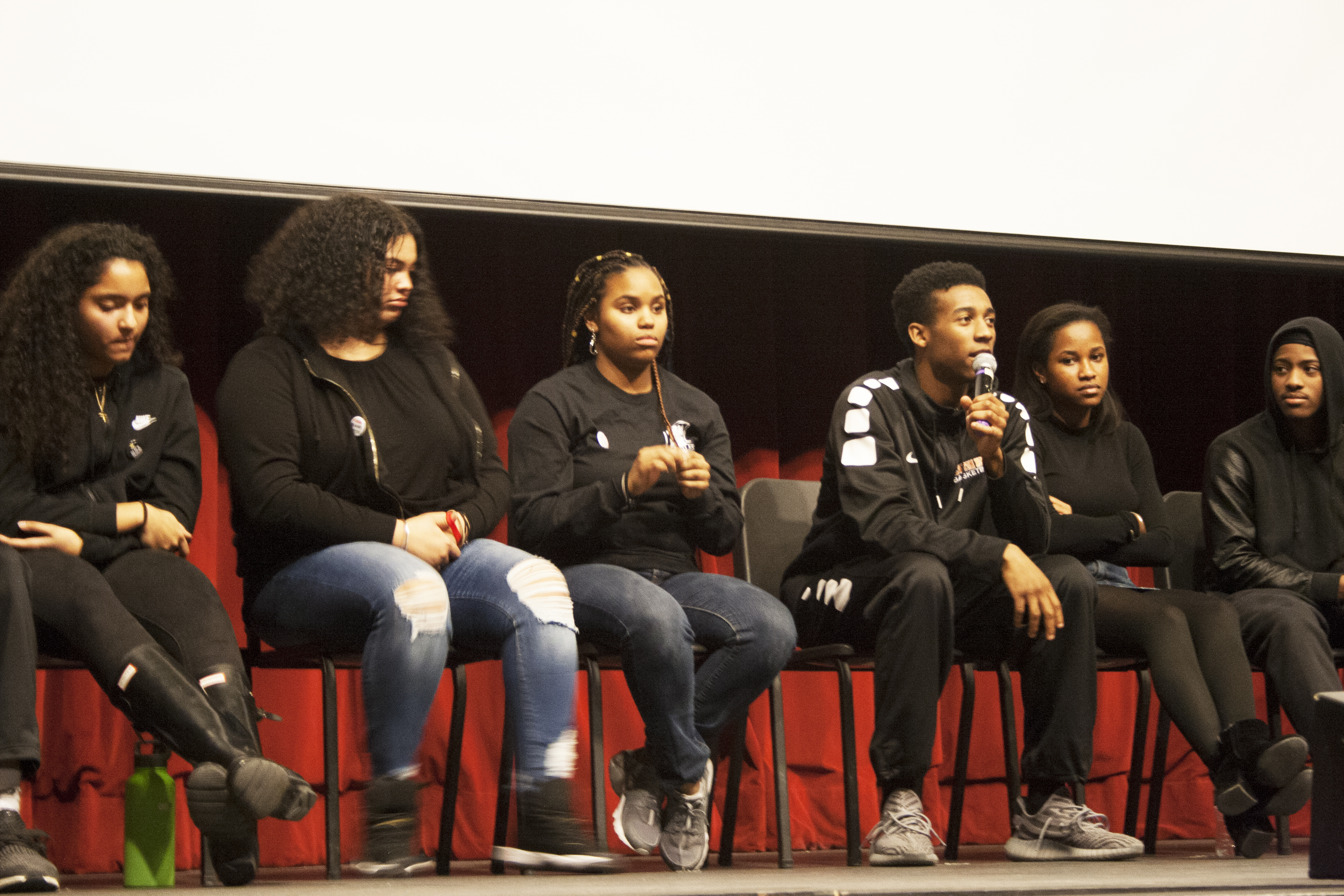 Several students discussed the “paper bag test,” where people with skin lighter than that of a paper bag would be treated differently than those with skin color that is darker than the bag. According to senior Tameek Bray said that people on opposing sides of the paper bag test may treat each other differently, even if they are both black.
Several students discussed the “paper bag test,” where people with skin lighter than that of a paper bag would be treated differently than those with skin color that is darker than the bag. According to senior Tameek Bray said that people on opposing sides of the paper bag test may treat each other differently, even if they are both black.
According to several panelists including Bray, the parents of those with a darker skin tone are more afraid to let their children be outside at night. Bray blamed the stereotypical description of a shooter as the reason for their parents’ fear.
After the moderators finished asking questions, the panelists opened up the discussion to questions from the audience. One student asked if it is ever okay to use slang directed towards black people. Rozier responded, “people don’t know that it’s never okay to use the n-word, even if Migos says it.”
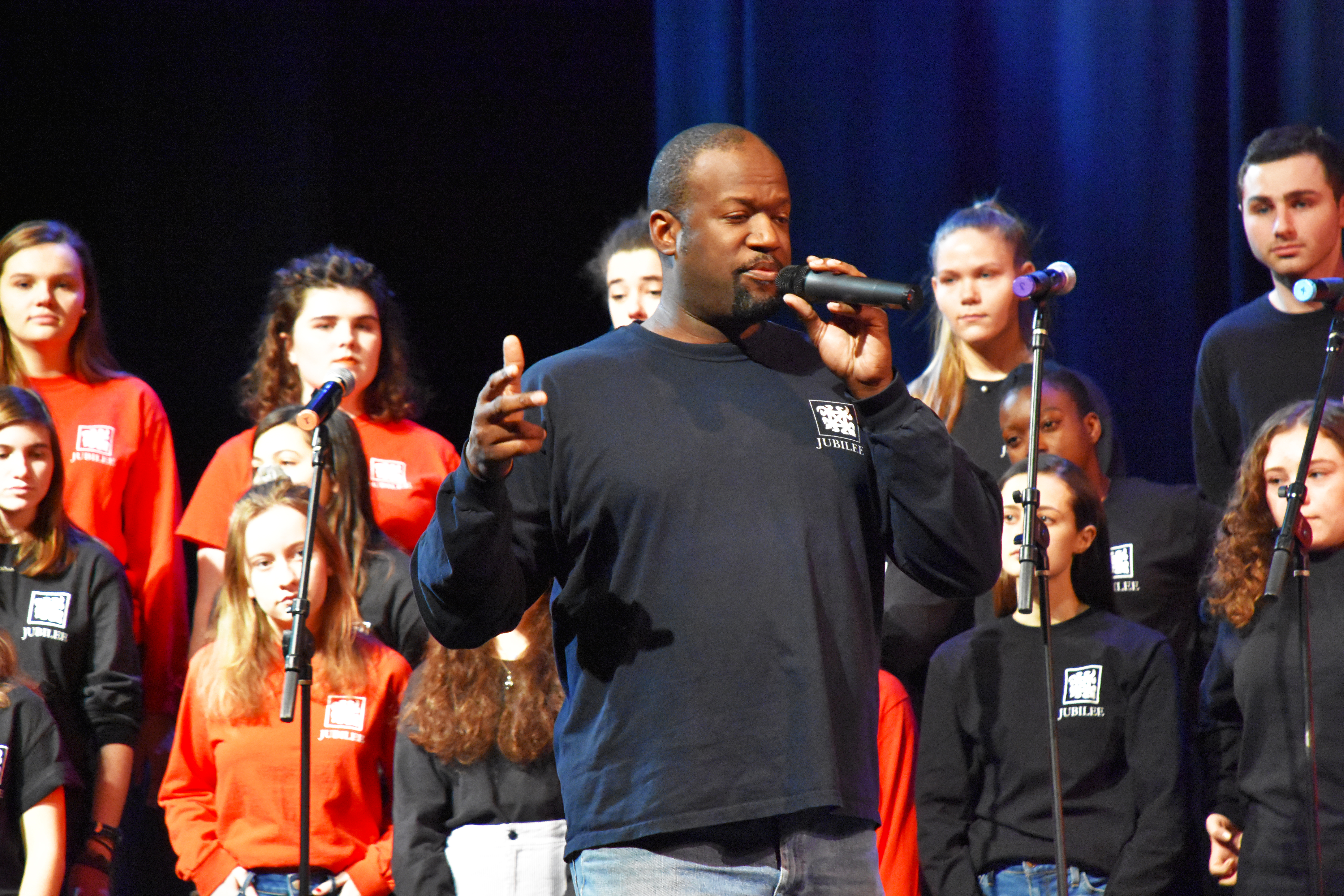
F-block
by Carolyn McDonald
Members of the Jubilee Singers performed African Diaspora music during F-block as part of BLAC Day.
African Diaspora is music that was developed in a period of slavery. The songs usually revolve around hope and fighting against oppression. All of the songs performed were of this genre.
Fitting into the BLAC Day theme of supporting each other as students of North, music director Sheldon Reid emphasized that the group works as a community.“Everyone is singing and contributing what they’re bringing,” he said. “It’s not about the individual, it’s about the collective.”
The singers started with a song called “Ain’t Gonna Let Nobody Turn Me Around” by The Roots. Reid chanted to the group during the song, and they sang back to him in response. Reid explained to the audience that the song is about protesting segregation.
The next song was “Joshua Fit The Battle Of Jericho,” a soulful piece that was a hit with the audience, and prompted a roar of applause. Sophomore Lara Saouli, an audience member explained that she “enjoyed the rhythm of that piece and how the singers harmonized.”
Then to demonstrate how quickly the class learns a song, Reid taught the singers a song called “Hold On” on stage in four minutes. Junior Kaylee Federman, a member of Jubilee added that “he gave us a note and then we put it all together, and just remembered what we do in class.”
The last two songs were the “Star Spangled Banner” by John Stafford Smith and “When He Comes I Shall Be Like Him” by Kirk Franklin. Before starting the “Star Spangled Banner” Reid asked, “have we yet become the land of the free and the home of the brave?”
BLAC Day presentations discuss racial discrimination, student experiences
February 7, 2018
Donate to The Newtonite
More to Discover








































